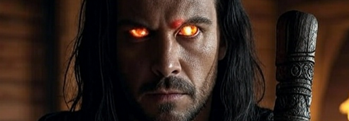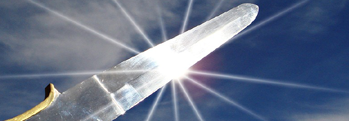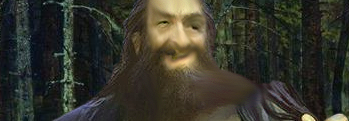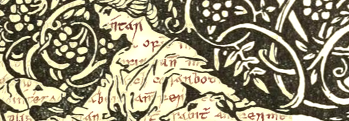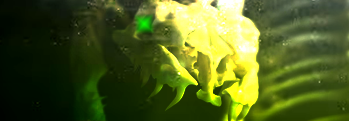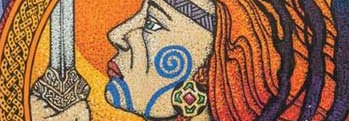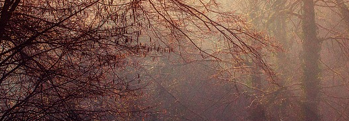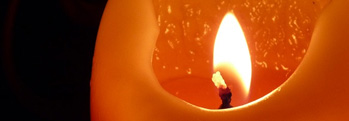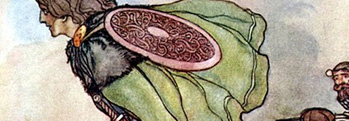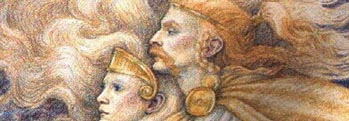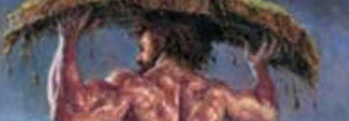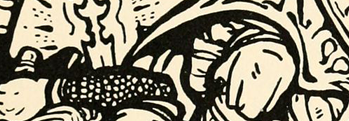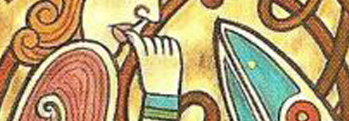The Hostel of the Quicken Trees
Irish and Celtic myths and legends, Irish folklore and Irish fairy tales from the Fenian Cycle
Battle is joined in The Hostel of the Quicken Trees
A dark horde of fell-handed warriors approached Ireland, sails gathered off the coast like storm clouds, billowing out in the gusts of uncertain wind, while oars bent to the rolling thunder of drums. Fierce indeed was the host of King Colgan, master of Lochlainn, and he came to make war on Cormac Mac Airt, High King of Ireland!
As soon as Fionn Mac Cumhaill heard what was afoot he quickly mustered the Fianna, brave warriors of Ireland, at his Dún on the Hill of Allen, and they marched out to the sound of brave horns and the cheers of the common folk.
Battle was joined and after many were killed, at last Colgan fell to Oscar, son of Fionn. Strife-weary and exhausted, Colgan's son Midac was captured and brought before Fionn. Having had his fill of blood that day and seeing Midac was but a young lad, he spared him and took him back to his home as a foster son.
As Midac grew to manhood many of the Fianna came to know him, and little enough they trusted him for in his heart they could feel a dark anger that never quite abated, so when he came of age Goll Mac Morna, the strongest of the Fianna, suggested to Fionn that he be sent away.
Although having little fear of Midac, Fionn did agree and told him he could live wherever he liked, and would be given lands and servants fitting for a young prince. Midac decided he'd live in Kanri on the Shannon river, and on some islands to the north of the mouth of that mighty waterway.
So there he dwelt for fourteen years, and with each passing year his bitter resentment grew, although none could say there was justice in it. Midac sent word to Lochlainn which he still considered his true home, and asked that an army be sent to carry out his vengeful dreams.
 Well, not only did Lochlainn send an army, more enemies came from far countries to marshall behind his banner! Sinsar of the Battles, the King of the World, from Greece, and the king's son, Borb the Haughty were there, as well as the three kings from the Island of Torrent, each accompanied by his own army, which they hid on Midac's island.
Well, not only did Lochlainn send an army, more enemies came from far countries to marshall behind his banner! Sinsar of the Battles, the King of the World, from Greece, and the king's son, Borb the Haughty were there, as well as the three kings from the Island of Torrent, each accompanied by his own army, which they hid on Midac's island.
Fionn was blithely unaware of the treachery which was afoot, so when he came upon Midac while out hunting with some of the Fianna, he cheerfully agreed to join him for a feast at the Hostel of the Quicken Trees, which was a hall made of Rowan, the tree of life. It seemed to Fionn that Midac was but being hospitable and repaying his generosity.
The hunting party was scattered hither and yon so Fionn left some of his men behind to wait and proceeded to the hall, although there oddly seemed to be no attendants, which struck him as peculiar. But he paid it no mind, as they were amazed at the richness they beheld, fine hangings on every wall, soft couches to rest on, and a bright roaring fire in the hearth to warm them.
It was a fine and bright place, with cunning inlaid carvings on the wood of its pillars and a scented thatch that was lit in the sun like golden hair, and all around it grew rowan trees with ripe berries red on them.
“Certainly you have done well for yourself” said Fionn to Midac but when he looked around his host was nowhere to be seen. “Odd,” he mused, and sat himself down anyway with his men.
Odder yet he thought it when the hangings rotted away into old leaves, and the fine strong walls were revealed as mouldy planks, the soft couches became mounds of freezing chilly earth and the many doors had disappeared!
Well Fionn had had enough so he told Conan to break down the door and they'd be off.
“Not a bother,” said Conan, making to rise, but then he fell back howling.
“Help, lads!” he shouted ”For I am fixed to this floor like I was a deep rooted quicken tree!”
When the others tried to get to him to help, they found themselves likewise caught, like flies in the web of a ghastly spider. Thinking quickly, Fionn put the thumb that had been burned by the skin of the Salmon of Knowledge in his mouth and the whole affair became clear to him.
Bitterly he groaned, “Fourteen years we've been plotted against and now the harvest is being reaped! Midac has a war host gathered on his island to destroy us, and it was by their black workings that we're stuck. The Three Kings of the Torrented Isle made the bargain which sealed our fate, and it is only by their blood being spilled on this cold clay that we will be freed again!”
The warriors of the Fianna put up a great hue and cry then, but Fionn bid them be silent, for it wasn't fitting for a warrior to wail and bemoan his troubles. Instead he told them to raise the Dord-Fian, the weird war cry of the Fianna, which could be heard by all in Ireland who had ears to hear.
Oisín, Diarmuid and the rest of the men who hadn't yet gathered heard the Dord and ran quickly to the hall, but Fionn told them not to set one foot inside, for they'd be caught too. He told them how the spell must be broken, and said to guard only the ford leading to the hall, as that was narrow and only two men at a time could cross.
In Midac's Dun on the Island there was great cheer and merrymaking at the news of Fionn's capture, and they thought the conquest of Ireland a done deed. One of the chieftains of the King of the World whispered to another that he'd away before the rest and take the heads of Fionn and his men, all the better to win the King's favour, and he took his army towards the Quicken wood.
When he got to the ford where one of Fionn's men waited, Innsa, he laughed at being challenged.
“I am to visit Fionn and bear away with me a keepsake, his head, and you're the very fellow to lead us to him!”
Innsa replied, “A strange way to carry out my orders that would be, since I've been told to hold this ford against all comers!”
So with a savage roar the chieftain had at him, and his army marched across the ford, but as he could only cross two abreast Innsa slew most of them before taking a mortal wound himself. Fiachna who was at the hall, hearing the sounds of battle, ran up just as Innsa fell and cut down the rest, so the few survivors returned to Midac in disarray.
That chieftain's brother meanwhile, wondering at the absence of his kin, went to find him but found only a ford choked with bodies and a sole warrior standing firm blocking the way. With a cry of fury he and his men launched themselves across the river, only to meet the same fate! But even so their numbers told and Fiachna was mortally wounded, although not before Oisín and several others came upon the scene and drove the enemy back.
Midac was enraged at the loss of his chieftains and stormed out with his own forces from Lochlainn, but when Oisín spied him he flung a jagged-tooth gae bolg spear into his chest, and Midac the traitor pulled his own innards out with it. Leaderless his raiders gave some fight but the heart was gone from them, and Diarmuid chopped Midac's head clean off.
Not so the three Kings of the Isle of Torrents, who were fresh and ready for struggle, although they paused to see the ford grown twice as wide with the mess of bodies choking it. Not waiting for them to charge, Oisín and Diarmuid sprang into the middle of them, and Diarmuid leaped the shields of his enemies with his yellow spear, striking the heads off the three kings as he did so.
From one side struck Diarmuid and from the other Oisín until at last the men of the Isle of Torrents were defeated. Then, remembering what Fionn had said about the undoing of the binding spell, Diarmuid tied the heads together and sprayed their warm blood on the door of the hostel, causing it fall aside with a mighty crash!
Within they beheld Fionn and his men, blinking owlishly in the setting sun.
“Well done you heroes, none such men as you have yet stood to protect the land of Ireland!” shouted Fionn, and told them to sprinkle the blood within, and so they did. The champions trapped within fell to the ground and rubbed their arms and legs, and Fionn knew they wouldn't be right until the sun rose again and washed away the last of the dark magic.
So Diarmuid returned to his watch at the ford with several other men of the Fianna to await the coming of the last of their foes, and they didn't have long to wait, for Borb the haughty had heard tell of the fate of the Three Kings and knew his time was now or never. He marched with desperate haste to the ford with Sinsar and struck with all his might, and the fighting carried on through the night.
It was a hard battle and grim, and often Diarmuid could see no further than the tip of his spear, which made it as well that he was so outnumbered for he couldn't fail to strike a foe! But he and his few held hard and fast until the dawn, when Fionn, Goll and the champions of the Fianna came forth in their battle fury, their strength fully returned.
It was still touch and go and the King of the World had sent a numberless horde of warriors, meaning to put an end to the Fianna once and for all, but Oisín the son of Fionn had lit out in the night and warned the rest of the hosts of Ireland about the invaders, so they came upon the struggle at noon.
With the Mornas and Baiscnes, the Mican-Smoils and the O'Navnan's at his back Oisín tore into the enemy with gusto, but it was Oscar who finally smote down Borb and Sinsar, dealing and receiving many wounds as he did so.
Their kings defeated, the invaders fled to their low ships and made good their escape with what few men and little dignity remained to them, and it was long and long before anyone dared challenge the Fianna again!
The Hostel of the Quicken Trees, or where it once stood, can be found below.
More Legends from the Fenian Cycle
Mongán mac Fíachnai was a prince of the Gaels, none other than he whose father was Fíachnae mac Báetáin, and it was about the seventh century in Ireland when he ruled over Ulster. Many are the tales told of him and his royal reign, with some even whispering that he was the son of Manannán mac Lir, ancient G ... [more]
The Corleck stone head is believed to be an ancient pagan idol, representing perhaps some ancestor or deity from the pre-Christian era in Ireland. The most striking aspect of the Corleck stone head is its three faces, set in strange, almost unsettling expressions, all the more remarkable for their simplicity of design, lacking ears or detailed feat ... [more]
The Clonoura shield was discovered standing upright in a bog in Clonoura, county Tipperary and represents one of the very few fully intact Iron Age shields that have ever been found. It is marked with many slash and stab scars from knives, swords, spears and other sharp weapons, and dates from 30 to 60 AD, pre-Christian Iron Age Ireland. It is q ... [more]
The days of the heroes of the Fianna have captured the imaginations of many throughout the ages, and one such was the ninth century poet Gofraidh Fionn O’Dalaigh, one of the finest poets in all of Killarney and all of Ireland. For it was his pen and none other that first put quill and ink to parchment and recorded the old story of Reicne F ... [more]
It was a fine day in Ireland many years ago when Fionn and his Fianna took a fancy to go out hunting. Warm was the sun amid the whispering glades of ancient forests, gentle was the breeze and sweet the scent of summer flowers in its bosom. Sweeter yet was the sight of a mighty deer to the eyes of the hunters, and so they gave chase, howling with de ... [more]
It was in the days of Fionn and the Fianna, a very long time ago in Ireland, that the people of Ben Edair decided to hold a festival, a Feis or Aonach, to celebrate the season. All of Fionn’s hosts were gathered, the seven ordinary warbands and the seven extraordinary warbands, and they danced and played music merrily with the people. Then ... [more]
There are few these days who have not heard of Fionn Mac Cumhaill, hero and defender of Ireland, or at least might recognise his name. But there were no creatures that Fionn loved amongst his three hundred dogs more than his two favourites, Bran and Sceolan, meaning Raven and Survivor, and though it’s a stranger story than most, this is the t ... [more]
It is not unusual for stories in the Irish legendarium to have more than one meaning besides that of a literal recounting of historical events, whether by accident or by design. Some tales were meant to be understood in the context of the era and culture of the story teller, while others might instruct in certain arts, and yet others contain myster ... [more]
Those monks who recorded the mythologies and folklore of Ireland which had previously been passed down by word of mouth from bard to druid to bard for countless generations were, by their very nature, devout Christians. As Christians they were dedicated to not only God and His Church, but to the people who bore and nurtured them, and everywhere the ... [more]
One day Fionn Mac Cumhaill, doughty hero of Ireland, and his friends Goll, Cialta and Oscar, as well as others of the Fianna, were resting after the hunt on a certain long hill now known by a different name. Their meal was being made ready, when what should happen only a girl of the kin of the giants came striding up and sat down among them, a grea ... [more]
Something which often appears in the most ancient tales of Ireland is the grisly vision of heads which speak after being separated from their bodies! This was said to be an art of the druids inherited from the necromancy of the Dé Danann, who were themselves said to be able to raise a whole army from the grave to fight again day after day! ... [more]
There once was a young fellow called Conall, and he lived with his parents in the east of the country. They lived a quiet life, catching fish and digging up oysters for meat and lamps, but one dark day the Fomors came and demanded tribute. Having none to give, his father bid the sea demons begone, but instead they made to take himself and his famil ... [more]
Young Fionn Mac Cumhaill was out walking with his dog Bran one fine morning, and he happened to pass into a deep and thick dark wood of the kind that once covered all of Ireland, for the hunting was better there, when what did he come across but a thousand horses hauling timber and men chopping down the trees and preparing the logs. "What a ... [more]
There was a mighty warrior in the west of Eriu, and Cumhal Mac Art was his name. Feared was his axe and he could skewer two men with a single cast of his feathered war-dart, and yet for all that he lived a lonely life, and a life of fear – for it had been foretold that should he ever marry, he would die in battle the very next day! But all ... [more]
It was in the day of Fionn Mac Cumhaill when he was an old man, yet still hale and hearty, that one of his warriors, whose name was Diarmaid son of Donn and grandson of Duibne, had carried off his young bride-to-be, Gráinne daughter of Cormac! The two had fallen in love and Gráinne, for all of Fionn's fame, wanted nothing to do wi ... [more]
One warm summer's day Fionn and his men were out hunting through the darkling forests of Ballachgowan in Munster, chasing deer and boar through the gloomy glades, when they stopped short all of a sudden and came face to face with a startling sight! For what had stepped between them and their prey but a strange, damp giant of a man. Black wer ... [more]
Fionn Mac Cumhaill stood at the door of his hunting lodge with his fists on his hips, his heart sinking as he realised his intentions to hunt for deer this day were lost in the waves of mist and fog that had rolled in from Dublin bay, although at that time it was known by a different name. It had come as far inland as Gleann na Smol, the Glen of th ... [more]
When Fionn Mac Cumhaill became leader of the Fianna, the fiercest and most warlike of those bands of heroes who lived in the wild places, hunting and acting as champions for their kings, and defending Ireland from evil, he decided that he wished to have only the best warriors to follow him. So he sat down and sucked his thumb to taste the wisdom ... [more]
Close by where Limerick city stands today lie the ruins of an ancient and once mighty fortress called Carrigogunnel, which commanded all the lands about with a stern hand. It was known then as a place of ill omen, and it is known today as the same, for it was once the home of an uncanny hag by the name of Gráinne. Amid the surrounding mar ... [more]
A dark horde of fell-handed warriors approached Ireland, sails gathered off the coast like storm clouds, billowing out in the gusts of uncertain wind, while oars bent to the rolling thunder of drums. Fierce indeed was the host of King Colgan, master of Lochlainn, and he came to make war on Cormac Mac Airt, High King of Ireland! As soon as Fionn ... [more]
Diarmuid the Fair, son of Donn or Duibhne of the Tuatha De Danann was one of the Fianna, the great warriors of ancient Ireland who protected the land from dangers near and far. It was said that no woman could resist his gaze, for he'd been granted the blessing of comeliness by the Ghost Queen Morrigan after he helped her out of a spot of bother ... [more]
Fionn Mac Cumhaill and the rest of the Fianna were resting after a great battle, weary and sore with sorrow at the loss of their fellows, when they spied coming along the shores of Loch Lein in County Kerry a beautiful young woman riding a swift horse, so swift indeed that its hooves scarcely seemed to touch the ground! Now although the women of ... [more]
Now it is known by some that the fairies of Ireland weren't much like the fairies we hear about in these latter days, harmless things of mischief and frolic, but were instead respected and often feared, for their anger was quick and their kindness was whimsical. Some would join men in battle, and some would make war on men, others were omens of ... [more]
It was a fine brisk spring morning in Ireland when Fionn Mac Cumhaill decided to take himself for a stroll along the white sandy beaches of the seashore, the better to breathe the air and enjoy the simple pleasures life had to offer. But that morning, life had more to offer and it didn't look pleasant, for it was a giant bearing down on the bea ... [more]
Fionn MacCumhaill was well known as a fair and handsome man, but his most distinguishing feature was his grey hair - and he was not born with it! Fionn was one time out on the green of Almhuin, and he saw what had the appearance of a grey fawn running across the plain. He called and whistled to his hounds then, but neither hound nor man heard hi ... [more]
After his seven years of training with the poet Finegas were done, Fionn Mac Cumhaill took himself from the river Boyne to the great hall of the High King in Tara, Conn of the Hundred Battles, to present himself there as a member of the Fianna, the very best of the best warriors throughout Ireland. Announcing himself, Conn took him into the band an ... [more]
Here is the story of how Fionn MacCumhaill gained the knowledge of the world. And wouldn't it be a great thing to know it all? Still, knowledge and wisdom must be balanced, and this was known to the young man called Fionn, which means fair and bright. He was fleeing from the warriors who had murdered his father when he came upon the hiding plac ... [more]




